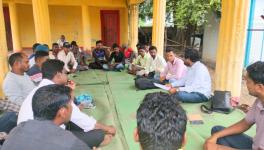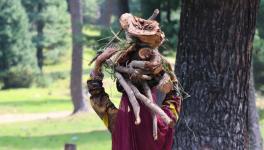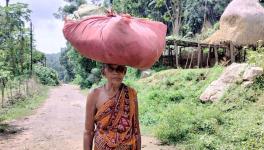UP: Tharu Tribals Set to Get Community Forest Rights After Prolonged Struggle
Image Courtesy: Youth Ki Awaaz
New Delhi: In a major win after eight years of struggle, the Tharu tribals in Uttar Pradesh’s Lakhimpur region, are set to get community rights to forest resources.
The region, which spans 46 villages, is largely occupied by the Tharu community. The tribal community uses grass collected from the forests to make and repair their huts every year. However, with the rejection of the community resources claims in July 2019, the community has been alleging that the forest department extorts money from the villagers and prevents them from collecting grass or using other forest resources.
In 1978, the Uttar Pradesh government declared Dudhwa as a national park. Following this, people belonging to the Tharu tribe, who were living inside the protected area, had been denied their right to access natural resources, such as wood, fruits and other means of livelihood, making them ‘encroachers’ on their own land. Forty four villages were relocated under the revenue status.
The claims of the community were reportedly consistently denied by the village-level committees creating one of the biggest hurdles to the implementation of the Forest Rights Act.
The Tharu tribals had filed claims in 2013, after which the Sub Divisional Level Committee (SDLC) recognised that these claims were worthy of rights and, therefore, recognised the rights of this Scheduled tribe on November 9 this year, after repeated meetings and a sustained agitation.
Speaking with NewsClick, Rajnish Gambhir of the All India Union of Forest Working People (AIUFWP), said: “We intensified our struggle, we kept engaging in protests, holding meetings, ultimately we had three meetings with the SDLC. We have now been assured by the forest department and the tribal affairs department that we will be given the claims and there is no objection or formality left.”
The file will be moved to the District Level Committee (DLC) on November 21, where all formalities will be completed, he said.
This development has given huge respite and new hope to the community. Speaking with NewsClick, Sehvaniya, a member of the community from Surma village, said: “This is a huge win for us and has come after a long drawn struggle. For me, it has been an inter- generational fight. My father was involved in this struggle and now I have been associated with this movement for the past five years. Our struggle has been fraught with difficulties. If we hadn’t won our rights, we would have lost our mother earth. This is crucial for our next generation.”
Hopng for better days ahead, she said: “This will finally put an end to the harassment we have been facing from the forest officials. Our people could not collect produce, we were asked to pay extortion money, we were charged with false cases. Now the youth of our community will not have to go out in search of work and can dream of sustaining themselves and their livelihoods.”
Originally hailing from Nepal, the Tharus consider themselves as the people of the forest. Their villages are within the forest area – so they are living in or living with the forest. They partially do agriculture and partially live on the forest produce. Spread across the districts of Lakhimpur, Surma, among other villages, has a total population of over 100,000.
There have been several cases that have been registered against the struggling Tharu tribals. In April 2016, 75-year-old Bhanduram of Jayanagar village was arrested allegedly on false charges.In 2015, the files of some community members went missing from the administration. The local residents alongside the AIUFWP re-submitted duplicate files to ensure the recognition of the claims in 2016.
Also Read: ‘Forest Department Pushing Tribal Land Claims Towards Rejection in UP’
Get the latest reports & analysis with people's perspective on Protests, movements & deep analytical videos, discussions of the current affairs in your Telegram app. Subscribe to NewsClick's Telegram channel & get Real-Time updates on stories, as they get published on our website.
























